Understanding what food dogs can t eat is crucial for any pet owner, as many common household foods can pose a serious threat to your canine companion’s health. While some human foods are perfectly safe and even beneficial for dogs, others are toxic even in small amounts, leading to severe illness or worse. The unfortunate reality is that pet poisonings are a significant concern, with over 401,500 cases reported annually in the United States, many of which are directly linked to food. As a loving dog parent, being prepared with accurate information on what foods you should never feed a dog is essential to keep your furry friend safe and healthy. This guide will serve as your essential resource to navigate the complexities of canine nutrition and identify the most dangerous foods to avoid.
Why Certain Foods Are Toxic to Dogs
Canine digestion and metabolism differ significantly from our own, which explains why humans can safely consume many foods that are harmful to dogs. A dog’s body processes certain substances very differently, leading to potential toxicity. For instance, dogs metabolize compounds like theobromine and caffeine found in chocolate much slower than humans. This slower metabolism allows these substances to accumulate rapidly in their system, potentially becoming fatal. Similarly, while the fleshy part of fruits like cherries might be harmless, the cyanide present in their pits, stems, and leaves can be problematic if ingested in large quantities.
Food toxicity can also vary based on a dog’s size, breed, and existing health conditions. A smaller dog, for example, might be more susceptible to the effects of a toxic substance than a larger breed. Therefore, always consulting your veterinarian with any concerns about items your dog cannot eat is paramount to ensure their well-being.
Key Toxic Foods You Should Never Feed Your Dog
Many household foods are not just unhealthy but actively dangerous—and often toxic—to dogs. It’s imperative to keep these items strictly out of your dog’s reach to prevent accidental ingestion and potential emergencies. This section details some of the most common and hazardous foods that every dog owner should be aware of.
1. Alcohol
Due to their smaller size, dogs and cats are significantly more vulnerable to the effects of alcohol than humans. Even minimal amounts can cause harm, with the danger increasing for smaller pets. Symptoms of alcohol poisoning in dogs mirror those in humans, including vomiting, breathing difficulties, loss of consciousness, or even death. Any exposure requires immediate veterinary attention.
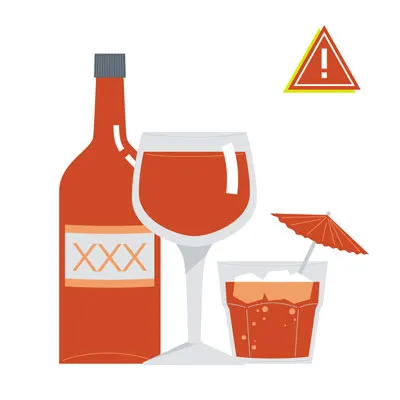 Glass of alcohol with a warning symbol
Glass of alcohol with a warning symbol
2. Apple, Apricot, Cherry, and Plum Seeds/Pits
While the fleshy part of apples is safe for dogs, the core and seeds are not. Apple seeds contain cyanide, and while small amounts may not be immediately harmful, it’s best to remove the core and seeds entirely. Similarly, apricot, cherry, peach, and plum seeds and pits also contain cyanide, which can lead to severe symptoms such as vomiting, irregular heartbeat, seizures, coma, and even death by preventing red blood cells from effectively carrying oxygen.
3. Avocado
Avocados are not a suitable food choice for dogs. They contain a fungicidal toxin called persin, which can cause vomiting and diarrhea in some animals, though its effects on dogs are debated. More concerning is the large pit, which poses a significant choking hazard and can cause an obstruction in a dog’s gastrointestinal tract if swallowed whole.
4. Caffeine and Coffee Grounds
Caffeine contains methylxanthines, compounds that can cause potentially fatal symptoms like diarrhea, vomiting, seizures, and an irregular heartbeat in dogs. Ingesting coffee grounds or high-caffeine drinks can lead to a racing heart, tremors, arrhythmia, and difficulty breathing, necessitating urgent medical care.
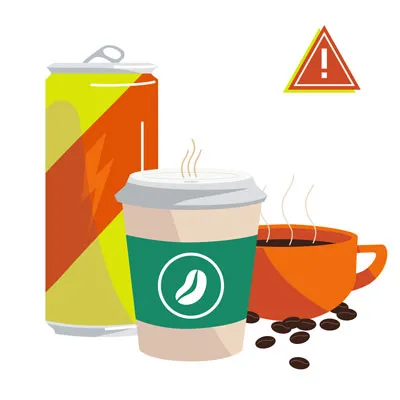 Coffee grounds and a cup of coffee
Coffee grounds and a cup of coffee
5. Chocolate
Chocolate toxicity is a frequent cause of pet poisoning. Chocolate contains theobromine, a substance dogs cannot metabolize efficiently. The darker the chocolate, the higher its theobromine content, making dark chocolate and baker’s chocolate particularly dangerous. Chocolate also contains caffeine, and some sugar-free varieties may contain xylitol, which is also highly toxic to dogs. Symptoms can range from hyperactivity, vomiting, and diarrhea to pancreatitis, abnormal heart rhythms, and seizures. Even a small amount of chocolate ingestion warrants an immediate call to your veterinarian.
6. Chicken & Turkey Skin, Ham, and Other Fatty Cuts of Meat
High-fat foods like chicken or turkey skin, ham, and other fatty cuts of meat are detrimental to dogs. Their high-fat content can trigger acute pancreatitis, a life-threatening illness with severe complications. Additionally, cooked bones from chicken or turkey should always be avoided as they can splinter, causing internal obstructions or damage to the stomach and intestines, potentially leading to fatal infections.
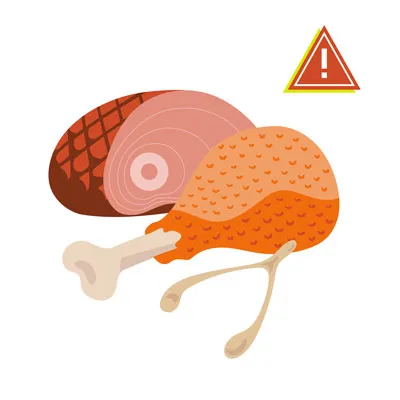 Fatty cuts of meat, including chicken skin and ham
Fatty cuts of meat, including chicken skin and ham
7. Grapes and Raisins
Grapes and raisins are exceptionally dangerous for dogs and can cause severe problems, including acute kidney failure. The tartaric acid in these fruits is toxic to a dog’s kidneys, and even a few bites can lead to devastating effects. Symptoms of grape or raisin poisoning include vomiting, diarrhea, loss of appetite, and changes in urination, including complete lack of urine production.
8. Macadamia Nuts, Almonds, and Pistachios
Macadamia nuts are highly toxic to dogs, causing painful symptoms such as weakness, overheating, and vomiting. As few as six nuts can induce severe poisoning in a small dog, though the exact mechanism of toxicity remains a mystery. Other nuts like almonds and pistachios, while not as acutely toxic as macadamia nuts, can still pose choking hazards or cause digestive upset, especially if flavored or spiced.
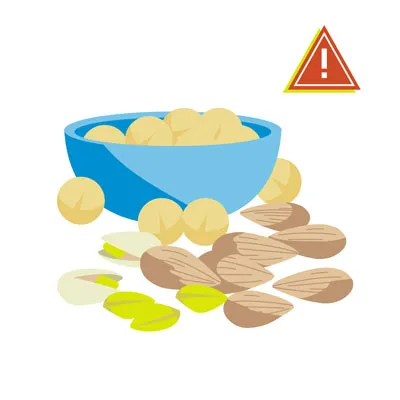 A bowl of macadamia nuts
A bowl of macadamia nuts
9. Onions, Garlic, Chives, and Leeks
All members of the allium family, including onions, garlic, chives, and leeks, are toxic to dogs. These vegetables contain sulfoxides and disulfides that can damage red blood cells, leading to anemia. This damage can be potentially fatal. It’s crucial to check food labels, as onion and garlic powders are common ingredients in many prepared foods. Certain Japanese breeds, like Akitas and Shiba Inus, are particularly sensitive, but all dogs are at risk.
10. Salt
Excessive salt intake can disrupt the fluid balance in a dog’s cells, leading to serious health issues. Too much salt can cause tremors, seizures, diarrhea, or even a coma. Whether it’s rock salt, homemade play dough, or salty snacks like potato chips, it’s vital to prevent your dog from consuming high quantities of salt.
11. Sugar-Free Gum and Candy (Xylitol)
Xylitol is an artificial sweetener found in many sugar-free products like gum, candy, and baked goods. In dogs, even small amounts of xylitol can cause a rapid and dangerous drop in blood sugar (hypoglycemia), leading to weakness and seizures. Some dogs may also develop liver failure. Xylitol poisoning cases are on the rise, and as little as five pieces of xylitol-containing gum can be lethal to a 65-pound dog.
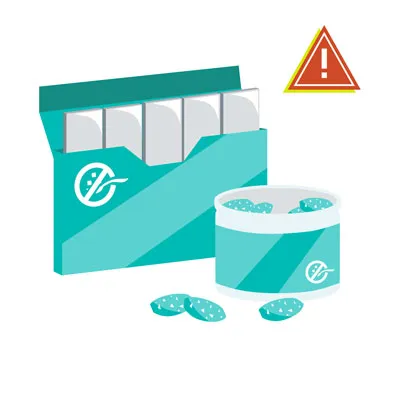 A pack of sugar-free gum
A pack of sugar-free gum
12. Yeast and Raw Dough
Yeast and raw dough are dangerous for dogs for multiple reasons. The raw dough can expand significantly in a dog’s stomach, causing severe pain, bloating, and potentially life-threatening gastric torsion or rupture. Furthermore, the yeast and sugar in raw dough can ferment, producing alcohol, which can lead to alcohol toxicity. This is a medical emergency requiring immediate intervention.
13. Raw Meat
You should never feed your dog raw or undercooked meat. Raw meat can contain harmful bacteria such as Salmonella or E. coli, which can cause severe illness in dogs, just as they do in humans. Additionally, bones in raw meat can pose choking hazards or cause internal injuries if splintered.
Foods That Are Generally Safe for Dogs
While the list of forbidden foods is extensive, there are plenty of human foods that dogs can safely enjoy as treats in moderation. These include apples (without core or seeds), bananas (without peel), blueberries, carrots, celery, cooked eggs, and plain, air-popped popcorn. For a more comprehensive understanding of suitable dietary options, consider exploring a list of what dogs can and cannot eat.
What Dogs Are Most at Risk if They Consume Toxic Foods?
While all dogs should avoid toxic foods, certain factors can increase a dog’s risk and the severity of symptoms:
- Small Breeds vs. Large Breeds: Smaller dogs are generally more vulnerable to toxic substances due to their lower body weight.
- Puppies: Young dogs have less developed digestive and immune systems, making them more susceptible to the adverse effects of certain substances.
- Elderly Dogs: Older dogs may be at higher risk due to pre-existing health conditions that can compromise their ability to process toxins.
- Dogs with Pre-existing Conditions: Conditions like diabetes or kidney disease can significantly heighten a dog’s risk from toxic food exposure. For more information on what to offer a sick dog, you may find our guide on what to give sick dog to eat helpful.
How To Prevent Dogs from Eating Toxic Foods
While accidents can happen, proactive measures can significantly minimize the risk of your dog ingesting unsafe human food:
- Store Foods Out of Reach: Keep all toxic foods on high shelves, in locked cabinets, or in secure containers that your dog cannot access.
- Avoid Feeding from Your Plate: Resist the urge to give your dog food directly from your plate or while you are cooking. It’s best to only offer treats specifically formulated for dogs.
- Educate Family and Guests: Ensure all family members and visitors understand the importance of not sneaking any human food to your dog, no matter how tempting.
- Be Careful During Holidays: Holidays often involve more food and distractions. Exercise extra caution during these times when cooking and entertaining to prevent accidental ingestion.
If your preventative measures fail and your dog eats something toxic, prompt action is critical. Keep contact information for emergency veterinarians and poison control services readily accessible. Learning what normal food can dogs eat can also help in discerning safe options from dangerous ones.
What To Do if Your Dog Eats Something Toxic
If you suspect your dog has ingested a toxic food, seek veterinary help as quickly as possible. Time is of the essence, and early intervention typically leads to more successful outcomes and shorter recovery periods.
Familiarize yourself with the common symptoms of food toxicity, which can vary depending on the substance ingested. These may include lethargy, distress, pain, vomiting, bloody stools, or a bloated and hard abdomen. If you observe any of these symptoms, immediately:
- Contact Your Veterinarian or Poison Control: Call for professional guidance right away.
- Provide Key Information: Be ready to share details such as the type of food eaten, the estimated amount consumed, and the time of ingestion.
- Avoid Home Remedies: Do not attempt any home remedies unless specifically instructed by your veterinarian, as some interventions, like inducing vomiting, can be harmful in certain situations.
Pets Best can provide valuable support in protecting your dog from unexpected toxins. With pet insurance plans tailored to your dog’s specific needs, and access to a 24/7 Pet Helpline, you can quickly consult with a veterinary expert if you’re concerned about something your pet may have eaten. Ensuring your pup’s diet is safe and appropriate is key to their long-term health, and understanding what type of food can puppies eat is especially important for young, vulnerable dogs. By staying vigilant and informed, you can help your dog steer clear of harmful foods and enjoy a happy, healthy life filled with safe and delicious treats.
References
- “Top 10 dog poisons,” Hilary Parker (5/2023), WebMD, https://www.webmd.com/pets/dogs/top-10-dog-poisons
- “What happens if a dog eats chocolate?” (10/2023), Colorado State University, https://vetmedbiosci.colostate.edu/vth/animal-health/why-is-chocolate-bad-for-dogs/
- “Fruits and vegetables dogs can or can’t eat,” (3/2024), American Kennel Club, https://www.akc.org/expert-advice/nutrition/fruits-vegetables-dogs-can-and-cant-eat/
- “What to do if your dog drinks alcohol,” Jerry Klein (7/2023), American Kennel Club, https://www.akc.org/expert-advice/vets-corner/is-alcohol-dangerous-for-dogs/
- “Can dogs eat apples?” Hector Joy (12/2022), PetMD, https://www.petmd.com/dog/general-health/can-dogs-eat-apples
- “Can dogs eat plums?” Katie Koschalk (7/2023), Chewy, https://be.chewy.com/nutrition-pet-diet-tips-can-dogs-eat-plums/
- “Avocado (Persea spp) Toxicosis in Animals,” Cristine Hayes (9/2024), Merck Veterinary Manual, https://www.merckvetmanual.com/toxicology/food-hazards/avocado-persea-spp-toxicosis-in-animals
- “People foods to avoid feeding your pets,” (n.d.), ASPCA, https://www.aspca.org/pet-care/animal-poison-control/people-foods-avoid-feeding-your-pets
- “People foods dogs can and can’t eat,” (3/2024), American Kennel Club, https://www.akc.org/expert-advice/nutrition/human-foods-dogs-can-and-cant-eat/
- “Can dogs eat nuts?” Amanda Ardente (1/2023), PetMD, https://www.petmd.com/dog/nutrition/can-dogs-eat-nuts
- “Can dogs drink milk?” Sandra C. Mitchell (1/2024), PetMD, https://www.petmd.com/dog/nutrition/can-dogs-drink-milk
- “Can dogs have nutmeg?” Barri J. Morrison (11/2023), PetMD, https://www.petmd.com/nutmeg-safe-dogs
- “Onion, garlic, chive, and leek poisoning in dogs,” Renee Schmid et al. (2024), VCA Animal Hospitals, https://vcahospitals.com/know-your-pet/onion-garlic-chive-and-leek-toxicity-in-dogs
- “Can dogs eat tomatoes?” Anna Burke (10/2024), American Kennel Club, https://www.akc.org/expert-advice/nutrition/can-dogs-eat-tomatoes/
- “Can dogs eat potatoes?” Katherine Ripley (11/2023), American Kennel Club, https://www.akc.org/expert-advice/nutrition/can-dogs-eat-potatoes/
- “What to do if your dog eats a cigarette butt,” (6/2023), American Kennel Club, https://www.akc.org/expert-advice/health/dog-ate-cigarette-butt/
- “Dough & dogs: Why it’s bad and what you can do,” Lisa Goldstein (7/2024), Preventive Vet, https://www.preventivevet.com/dogs/dough-is-toxic-to-dogs
- “Rhubarb,” (n.d.), Pet Poison Helpline, https://www.petpoisonhelpline.com/poison/rhubarb/
- “Can dogs drink carbonated water?” Heather Logue (n.d.), Rover, https://www.rover.com/blog/can-dogs-drink-carbonated-water/
- “What fruits can dogs eat?” Ellen Malmanger (2/2024), PetMD, https://www.petmd.com/dog/nutrition/what-fruits-can-dogs-eat
- “Can dogs have green beans?” Anna Burke (8/2022), American Kennel Club, https://www.akc.org/expert-advice/nutrition/can-dogs-have-green-beans/
- “About pet food safety,” (4/2024), CDC, https://www.cdc.gov/healthy-pets/about/pet-food-safety.html
